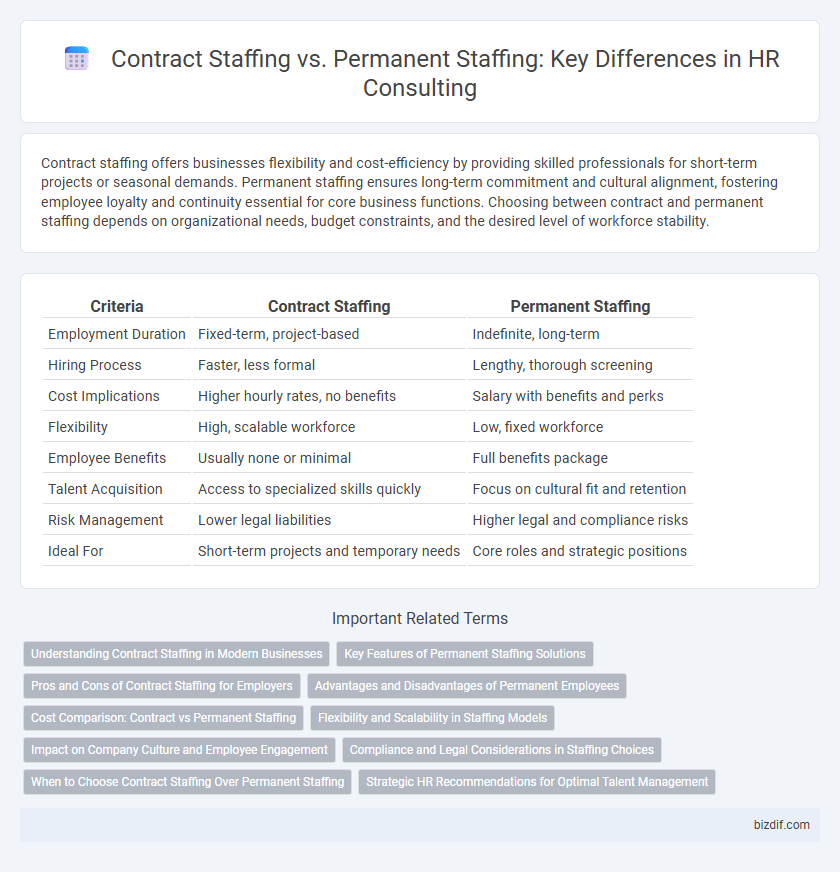Contract staffing offers businesses flexibility and cost-efficiency by providing skilled professionals for short-term projects or seasonal demands. Permanent staffing ensures long-term commitment and cultural alignment, fostering employee loyalty and continuity essential for core business functions. Choosing between contract and permanent staffing depends on organizational needs, budget constraints, and the desired level of workforce stability.
Table of Comparison
| Criteria | Contract Staffing | Permanent Staffing |
|---|---|---|
| Employment Duration | Fixed-term, project-based | Indefinite, long-term |
| Hiring Process | Faster, less formal | Lengthy, thorough screening |
| Cost Implications | Higher hourly rates, no benefits | Salary with benefits and perks |
| Flexibility | High, scalable workforce | Low, fixed workforce |
| Employee Benefits | Usually none or minimal | Full benefits package |
| Talent Acquisition | Access to specialized skills quickly | Focus on cultural fit and retention |
| Risk Management | Lower legal liabilities | Higher legal and compliance risks |
| Ideal For | Short-term projects and temporary needs | Core roles and strategic positions |
Understanding Contract Staffing in Modern Businesses
Contract staffing offers businesses flexibility by enabling them to hire skilled professionals for specific projects or fixed durations without long-term commitments. This approach allows companies to quickly scale their workforce in response to fluctuating market demands while managing labor costs effectively. Modern businesses leverage contract staffing to access specialized expertise and maintain operational agility in dynamic industries.
Key Features of Permanent Staffing Solutions
Permanent staffing solutions prioritize long-term employee retention, offering consistent skill development and cultural alignment within organizations. Key features include comprehensive onboarding, employee benefits, career progression opportunities, and job security, which enhance workforce stability and productivity. This approach reduces turnover costs and fosters a committed, experienced talent pool essential for sustained business growth.
Pros and Cons of Contract Staffing for Employers
Contract staffing offers employers flexibility to scale their workforce based on project demands, reducing long-term financial commitments such as benefits and severance costs. However, it may lead to higher turnover rates and potentially lower employee loyalty, impacting team cohesion and knowledge retention. Employers must weigh these factors against the need for specialized skills and quicker onboarding timelines.
Advantages and Disadvantages of Permanent Employees
Permanent employees offer long-term stability and deep organizational knowledge, enhancing team cohesion and reducing turnover costs. However, higher fixed costs such as salaries, benefits, and training expenses can impact budget flexibility. Limited workforce agility may hinder rapid scaling or adapting to fluctuating project demands in dynamic market conditions.
Cost Comparison: Contract vs Permanent Staffing
Contract staffing generally incurs higher hourly rates compared to permanent staffing due to the inclusion of agency fees and lack of long-term benefits commitments. Permanent staffing requires significant upfront costs such as recruitment, onboarding, training, and employee benefits like health insurance, retirement plans, and paid leave. Evaluating total cost of ownership reveals contract staffing offers flexibility and variable costs, whereas permanent staffing involves fixed, long-term financial commitments.
Flexibility and Scalability in Staffing Models
Contract staffing offers unparalleled flexibility by enabling organizations to quickly adjust workforce size based on project demands, reducing overhead costs associated with long-term employment. Permanent staffing provides stability and continuity but lacks scalability, making it less adaptable to fluctuating business needs. Leveraging contract staffing models enhances scalability by allowing rapid deployment of specialized talent without long-term commitments, optimizing resource allocation in dynamic market conditions.
Impact on Company Culture and Employee Engagement
Contract staffing offers flexibility and brings diverse skills that can invigorate company culture, yet may challenge long-term employee engagement due to limited commitment. Permanent staffing fosters stronger employee loyalty and deeper integration within organizational values, enhancing sustained engagement and cultural cohesion. Balancing contract and permanent roles is crucial for maintaining a dynamic yet stable workforce aligned with company objectives.
Compliance and Legal Considerations in Staffing Choices
Contract staffing offers flexibility but requires strict adherence to labor laws, including contract terms, wage regulations, and benefits compliance to avoid legal disputes. Permanent staffing demands thorough background checks, employment contracts aligned with labor standards, and adherence to statutory benefits such as social security and health insurance. Both staffing choices necessitate vigilant compliance with regional employment regulations to mitigate risks and ensure lawful hiring practices.
When to Choose Contract Staffing Over Permanent Staffing
Contract staffing is ideal for projects requiring specialized skills on a short-term basis, enabling businesses to scale teams quickly without long-term commitments or benefits costs. It suits fluctuating workloads and urgent talent needs, allowing flexibility and cost-efficiency in talent acquisition. Companies facing seasonal demands, pilot programs, or trial periods for new roles benefit significantly from contract staffing over permanent hiring.
Strategic HR Recommendations for Optimal Talent Management
Strategic HR recommendations emphasize leveraging contract staffing for project-based flexibility and cost efficiency while utilizing permanent staffing to build organizational culture and long-term skills retention. Data-driven workforce planning integrates contract and permanent roles to align talent supply with business demand, optimizing productivity and minimizing turnover risks. Implementing hybrid talent models enables agile talent management, balancing immediate operational needs with sustainable human capital development.
Contract Staffing vs Permanent Staffing Infographic

 bizdif.com
bizdif.com